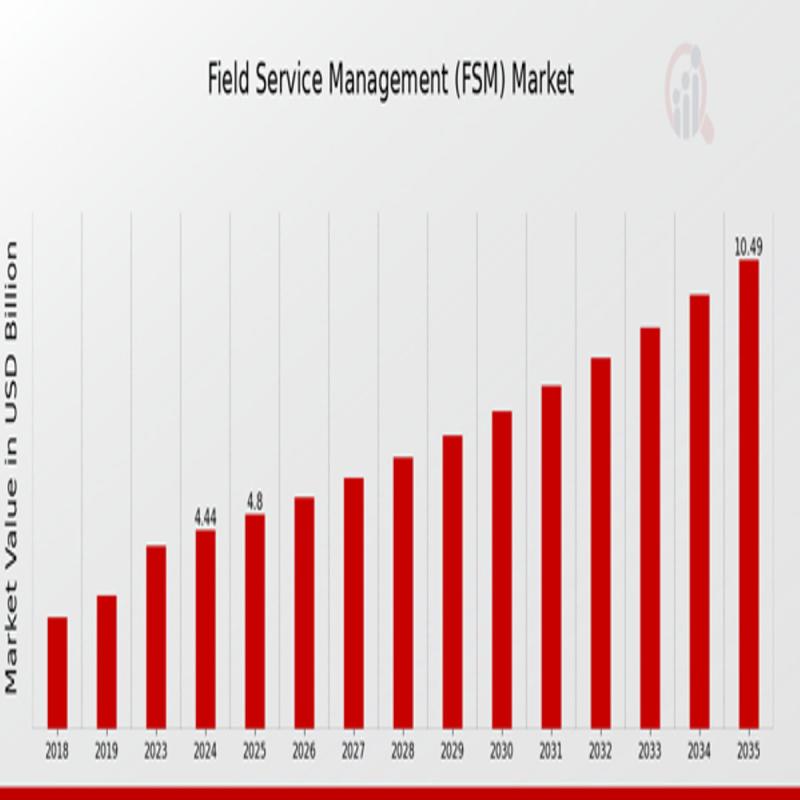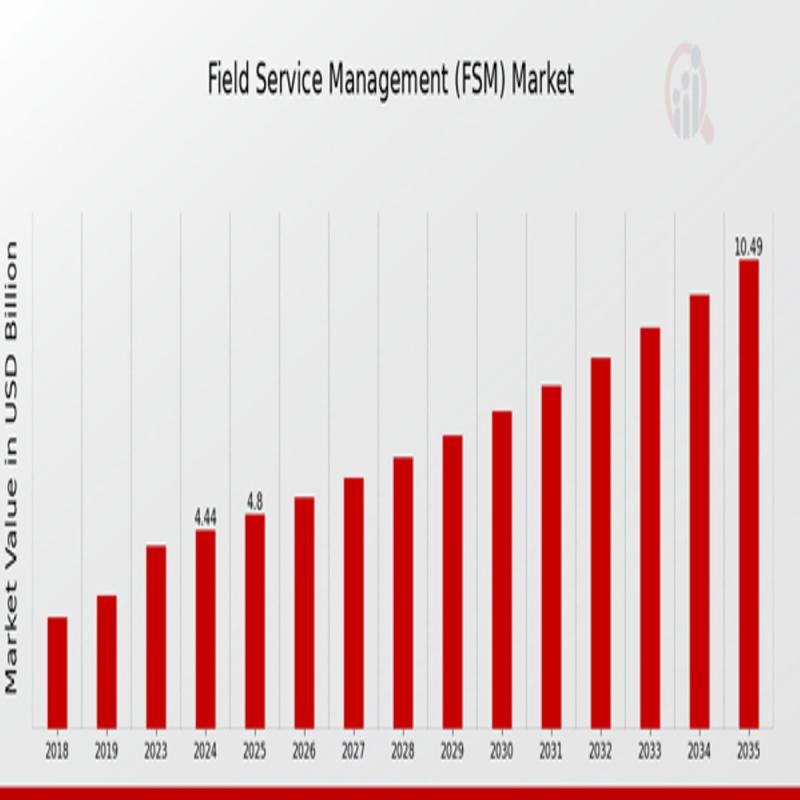Field Service Management (FSM) Market Overview:
The Field Service Management (FSM) market has evolved significantly in recent years, driven by technological advancements and the rising demand for real-time data processing and customer-centric service models. FSM refers to the systems and technologies used to coordinate field operations through a mobile workforce. It includes functions like scheduling, dispatching, invoicing, tracking, and analytics to improve efficiency and reduce operational costs. With industries such as utilities, telecom, healthcare, and manufacturing relying heavily on field services, FSM solutions have become an essential component in managing remote operations effectively.
Field Service Management Market size is projected to grow to USD 10.5 Billion by 2035, exhibiting a CAGR of 8.14% during the forecast period 2025 – 2035. This market has experienced rapid digitization, with cloud-based FSM solutions leading the transformation. Organizations are moving away from traditional manual processes to adopt automated and intelligent FSM platforms that provide real-time visibility and enhanced productivity. Additionally, the proliferation of mobile devices, IoT-enabled equipment, and AI-powered tools has further accelerated FSM adoption. Enterprises are increasingly investing in FSM software to gain better control over their workforce, ensure timely service delivery, and enhance the overall customer experience. The global FSM market continues to witness robust growth, reflecting the urgent need for operational agility in a highly competitive landscape.
➤ Click Here to Get Sample Premium Report –https://www.marketresearchfuture.com/sample_request/1574
Segment Insights:
The FSM market can be broadly segmented based on component, deployment mode, organization size, vertical, and region. By component, the market comprises solutions and services. Solutions include work order management, inventory management, mobile field execution, and workforce optimization. Services consist of consulting, implementation, and support services that ensure successful software deployment and integration. These components together enhance field service operations by delivering efficiency, accountability, and customer satisfaction.
Deployment mode is another crucial segment, divided into on-premises and cloud-based solutions. Cloud-based FSM platforms dominate the market due to their scalability, affordability, and ease of access. Small and medium-sized enterprises (SMEs) prefer cloud solutions to manage their operations without hefty upfront investments. On the other hand, large enterprises often opt for hybrid models to maintain control over sensitive data. Each deployment type caters to specific business needs, further diversifying the FSM solution landscape and increasing its accessibility across sectors.

Key Players:
The FSM market is highly competitive, with several key players offering a wide range of products and services to meet diverse client needs. Leading companies include,
• Oracle Corporation
• SAP SE
• Microsoft Corporation
• ServiceMax (a part of PTC Inc.)
• Salesforce.com Inc.
These players continuously innovate to expand their FSM capabilities, integrating AI, machine learning, and IoT technologies into their solutions to stay ahead of the competition. Their focus lies in offering customizable and scalable platforms for enterprises of all sizes.
Other significant contributors include IFS AB, Trimble Inc., Zinier Inc., FieldAware, and ClickSoftware Technologies Ltd. (acquired by Salesforce). These firms provide specialized FSM solutions tailored for specific verticals such as energy, telecom, and healthcare. The presence of several niche vendors has also led to a fragmented market, encouraging constant innovation and service improvement. Strategic partnerships, product launches, and mergers and acquisitions are common strategies used by these players to expand their market presence globally.
Market Drivers:
One of the primary drivers of the FSM market is the increasing demand for automation and digital transformation in field operations. Businesses today face pressure to deliver high-quality service at lower costs, and FSM software helps achieve that by automating manual processes and enabling real-time decision-making. The use of advanced analytics tools within FSM platforms allows companies to predict issues, optimize routes, and manage resources efficiently, thereby boosting operational performance and customer satisfaction.
Another significant driver is the rising use of mobile devices and wearable technology among field personnel. Smartphones, tablets, and wearable sensors provide technicians with instant access to work orders, manuals, and customer information. This not only enhances their productivity but also improves the quality of service delivered. Furthermore, the integration of IoT with FSM allows for real-time equipment monitoring and predictive maintenance, reducing downtime and enhancing asset lifecycle management. These innovations collectively drive the market forward, making FSM a cornerstone of modern business operations.
Industry Developments:
Recent industry developments in the FSM market reflect the broader trend toward AI integration, automation, and customer experience optimization. Many vendors have launched AI-powered virtual assistants and chatbots within their FSM platforms to assist field technicians and reduce support response time. These tools help diagnose problems, suggest solutions, and even generate reports automatically, streamlining workflow management and boosting employee efficiency.
Strategic acquisitions have also shaped the FSM market landscape. For instance, Salesforce’s acquisition of ClickSoftware has strengthened its position in the FSM space by integrating intelligent scheduling and dispatch tools with its existing CRM platform. Similarly, partnerships between FSM vendors and telecom or energy companies have led to the development of highly tailored solutions for specific industry use cases. These collaborations help vendors stay ahead of technological advancements while offering enhanced value to customers across different verticals and regions.
Regional Analysis:
North America leads the global FSM market, driven by widespread technological adoption, a strong presence of key vendors, and high demand for cloud-based solutions. The United States, in particular, has seen major deployments in sectors like telecom, utilities, and healthcare. Organizations here are quick to adopt cutting-edge technologies like AI, IoT, and AR to enhance their FSM capabilities and improve customer service delivery. Moreover, the region benefits from a well-established infrastructure and favorable investment climate, contributing to its FSM market dominance.
Asia-Pacific is the fastest-growing region in the FSM market, propelled by rapid industrialization and a booming service sector. Countries such as China, India, Japan, and South Korea are witnessing increased investments in digital infrastructure, making them key targets for FSM vendors. The region’s large and growing mobile workforce, coupled with rising demand for efficient field services, is creating a fertile ground for FSM adoption. Government initiatives supporting digital transformation further accelerate this trend, making Asia-Pacific a strategic growth region for FSM providers.
Future Outlook:
The future of the FSM market looks promising, with continued innovation and increased adoption across industries. As enterprises focus more on customer-centric models, FSM platforms will evolve to offer more personalized, predictive, and proactive services. Integration of augmented reality (AR) and virtual reality (VR) technologies is expected to gain traction, allowing technicians to receive remote assistance and immersive training in real-time. These tools will further enhance field service accuracy and reduce operational costs.
Sustainability will also become a major focus area for FSM vendors and users alike. Eco-friendly practices such as route optimization, paperless workflows, and energy-efficient equipment will gain importance as businesses aim to reduce their carbon footprint. In addition, as cybersecurity becomes a growing concern, especially with the rise of connected devices, vendors will invest heavily in robust security frameworks to protect data and infrastructure. These developments will shape a more intelligent, secure, and sustainable FSM ecosystem in the years to come.
The Field Service Management (FSM) market is undergoing a dynamic transformation fueled by digital innovation, rising customer expectations, and the need for operational efficiency. With solutions spanning across scheduling, dispatching, mobility, and analytics, FSM is becoming indispensable for organizations managing remote or on-site operations. Segmentation based on components, deployment modes, and end-user industries highlights the diversity and flexibility of FSM offerings.
Key players continue to drive the market forward through technological advancements and strategic partnerships, while growing mobile and IoT integration makes FSM more agile and intelligent. Supported by strong market drivers and industry developments, the FSM sector is poised for sustained global growth. Regions like North America lead in maturity, while Asia-Pacific offers vast untapped opportunities. Looking ahead, the future of FSM will be defined by AI, AR, sustainability, and cybersecurity, ensuring a smart, secure, and efficient service landscape.
About Market Research Future:
At Market Research Future (MRFR), we enable our customers to unravel the complexity of various industries through our Cooked Research Report (CRR), Half-Cooked Research Reports (HCRR), Raw Research Reports (3R), Continuous-Feed Research (CFR), and Market Research & Consulting Services.
MRFR team have supreme objective to provide the optimum quality market research and intelligence services to our clients. Our market research studies by products, services, technologies, applications, end users, and market players for global, regional, and country level market segments, enable our clients to see more, know more, and do more, which help to answer all their most important questions.
Also, we are launching “Wantstats” the premier statistics portal for market data in comprehensive charts and stats format, providing forecasts, regional and segment analysis. Stay informed and make data-driven decisions with Wantstats.
Contact Us:
Market Research Future (Part of Wantstats Research and Media Private Limited)
99 Hudson Street, 5Th Floor
New York, NY 10013
United States of America
+1 628 258 0071 (US)
+44 2035 002 764 (UK)
Email: sales@marketresearchfuture.com
Website: https://www.marketresearchfuture.com
This release was published on openPR.





